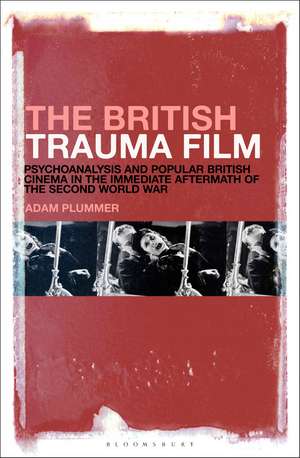The British Trauma Film: Psychoanalysis and Popular British Cinema in the Immediate Aftermath of the Second World War
Autor Adam Plummeren Limba Engleză Hardback – 17 mai 2023
Preț: 539.42 lei
Preț vechi: 773.45 lei
-30% Nou
Puncte Express: 809
Preț estimativ în valută:
103.22€ • 108.04$ • 85.91£
103.22€ • 108.04$ • 85.91£
Carte tipărită la comandă
Livrare economică 31 martie-14 aprilie
Preluare comenzi: 021 569.72.76
Specificații
ISBN-13: 9798765100479
Pagini: 240
Ilustrații: 55 bw illus
Dimensiuni: 152 x 229 mm
Greutate: 0.49 kg
Editura: Bloomsbury Publishing
Colecția Bloomsbury Academic
Locul publicării:New York, United States
Pagini: 240
Ilustrații: 55 bw illus
Dimensiuni: 152 x 229 mm
Greutate: 0.49 kg
Editura: Bloomsbury Publishing
Colecția Bloomsbury Academic
Locul publicării:New York, United States
Caracteristici
Reveals how the apparently normative deployment of psychoanalysis in films of this time provides space for subversive practices linked to gender and sexual difference
Notă biografică
Adam Plummer has taught film theory, film history, and film philosophy at Queen Mary University of London, UK, and is now an independent writer and researcher based in the UK.
Cuprins
List of IllustrationsAcknowledgementsIntroduction 1. Althusser and Foucault, Psychoanalysis as Ideology and Discourse, and the Place of the British Trauma Film in British Immediate Post-War Cinema2. "Broken Attachments and Traumatic Repetition": Psychoanalytic Perspectives on Loss, Trauma, Anxiety, and the Fragmentation of the Family Unit in The Halfway House3. "The Perpetual Recurrence of the Same Thing": The Compulsion to Repeat the Trauma ad Infinitum, Male Anxiety, Sexual Difference, and Motherhood, and the Interplay between Subjectivity and Objectivity in Dead of Night4. "What Does a Woman Want?": Childhood Trauma, Female Desire, and Female Subjectivity in The Seventh Veil and Madonna of the Seven Moons5. "The World is Full of Neurotics": The Traumatized Serviceman, the Collapse of Maternal and Paternal Functions, and the Effects of Post-War Cultural Malaise in They Made Me a Fugitive and Mine Own ExecutionerConcluding Remarks BibliographyThe British Trauma Film - A FilmographyGeneral FilmogrpahyIndex
Recenzii
The British Trauma Film is a revisionist account of a group of films released in the immediate post-war period that work through the experience of trauma, articulating important social concerns as well as depicting psychological disturbance. This lucid study provides a new perspective on a particular historical moment that adds significantly to our understanding of British cinema.
In this wide-ranging and original work, Adam Plummer charts a fascinating journey, revealing the influence of psychoanalysis on British cinema from the post-war period. Arguing that psychoanalysis occupies a central role in films such as The Halfway House, Dead of Night, The Seventh Veil, Madonna of the Seven Moons, They Made Me a Fugitive, and Mine Own Executioner, Plummer makes a compelling case for the critical value of reflecting on the meaning that psychoanalysis carried during a turbulent period of social and cultural change in the British context. In a masterful move, Plummer moves beyond the analysis of film at the textual level to develop a rich argument about the ways in which cinema in all its specificity was put to work as a means of processing traumatic experience, loss, and the emotional fallout from war. Drawing extensively on critical and psychoanalytical ideas about the workings of ideology, he goes still further to reveal how the apparently normative deployment of psychoanalysis on screen provides valuable spaces for resistant and subversive social practices linked to gender and the dynamics of sexual difference.This is an innovative study grounded in the empirical analysis of press packs, reviews, scripts, and close textual analysis, all of which brings to life the sophisticated theoretical argument at the heart of the work. A must read for any scholar interested in the value of psychoanalytic approaches to culture broadly defined and for scholars of cinema and its histories.
In this wide-ranging and original work, Adam Plummer charts a fascinating journey, revealing the influence of psychoanalysis on British cinema from the post-war period. Arguing that psychoanalysis occupies a central role in films such as The Halfway House, Dead of Night, The Seventh Veil, Madonna of the Seven Moons, They Made Me a Fugitive, and Mine Own Executioner, Plummer makes a compelling case for the critical value of reflecting on the meaning that psychoanalysis carried during a turbulent period of social and cultural change in the British context. In a masterful move, Plummer moves beyond the analysis of film at the textual level to develop a rich argument about the ways in which cinema in all its specificity was put to work as a means of processing traumatic experience, loss, and the emotional fallout from war. Drawing extensively on critical and psychoanalytical ideas about the workings of ideology, he goes still further to reveal how the apparently normative deployment of psychoanalysis on screen provides valuable spaces for resistant and subversive social practices linked to gender and the dynamics of sexual difference.This is an innovative study grounded in the empirical analysis of press packs, reviews, scripts, and close textual analysis, all of which brings to life the sophisticated theoretical argument at the heart of the work. A must read for any scholar interested in the value of psychoanalytic approaches to culture broadly defined and for scholars of cinema and its histories.
